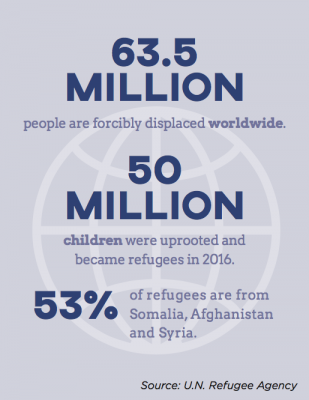How can we be useful in conflict zones and complex emergencies?
October 15, 2017
Dilshad Jaff, MD, MPH
Adjunct assistant professor of maternal and child health
Program coordinator for solutions to complex emergencies, Research, Innovations and Global Solutions
One must learn to adapt quickly in circumstances such as those. Once, I volunteered to manage an emergency room in a hospital that had no electricity or water. These things can be done with planning, creativity, collaboration and patience.
I’ve led mental health care, health education and vaccination programs at a primary health care center in Iraq. I’ve taught triage techniques, pharmacy management and infection control to nurses and others who didn’t know the most basic hygiene practices or how to provide quality care.
Recently, I’ve begun to work more with agencies, helping them become aware of the many layers of dysfunction in health-care systems in conflict-ridden countries. The collapse of the health system – and of health care access and safety/security – in wartime makes those in need of care so vulnerable. These circumstances also endanger and dishearten the health-care providers.
Education is an important basic need.
Education is crucial in developing infrastructure and delivering medical training – but it’s also essential to populations at large.

Imagine that a whole generation is disrupted, kept from schooling, denied education that gives them job skills. It isn’t so hard to imagine – globally, in 2016, 50 million children were uprooted and became immigrants or refugees.
Those who are poor and without refuge are vulnerable to every dangerous belief system. Either we educate these who are lost, or they choose violence. It is as simple as that. Public health professionals must confront the lack of education and be on the front lines in bringing people together and healing wounds.
Educated people learn to reason and make decisions about their lives. They learn how to understand and tolerate others. Teaching will create generations of peacemakers who will work to make our world a better place. If I could convince charitable organizations of one thing that would improve the lives of people in war zones – and ultimately would improve the standing of us in the U.S. – it would have to do with education – and more education!
Build schools, provide books and other tools for learning, share cultural experiences. Improve curricula and train teachers and other educators, remembering that in areas disrupted for long periods by conflict, a generation of people can be lost. Now more than ever, it is critical to push education to the top of local and global priorities. Public health is one of the best ways to innovate and support education in these settings.
Storytelling, which has a valued role in many societies, is an effective way to educate.
 Researchers in health behavior are aware of this. Whole communities have been educated when they hear the personal stories of people who have smoked tobacco and suffered terrible health consequences. Smokers become isolated because so many now have accepted that “smoking hurts people.”
Researchers in health behavior are aware of this. Whole communities have been educated when they hear the personal stories of people who have smoked tobacco and suffered terrible health consequences. Smokers become isolated because so many now have accepted that “smoking hurts people.”
In my own work, I have studied the impact of female genital mutilation. Elders often want to hold on to traditional ways, but telling the stories of girls and women who have experienced the procedure may finally make it unacceptable to allow this traumatizing and physically dangerous act to continue. I believe that sharing more local and global stories will contribute to peace-building and will ensure improved health and safety for future generations.
Q: Aren’t you afraid when you place yourself in a a conflict zone?
A: I am terrified. Of course, I am – because I’m human. But there are things that must be done because they are the right thing to do. I am sometimes more, and sometimes slightly less, terrified than the people I am trying to serve. However, I think we must push past what we think we’re capable of so that we can give hope and opportunity to those who otherwise have no escape from the madness of war and the crimes of ignorance.
In addition to advancing principles that preserve life and health, the field of public health offers us these wonderful opportunities to be human with – and learn from – one another.
Learn more at tinyurl.com/UNICEF-uprooted-children.
Carolina Public Health is a publication of the University of North Carolina at Chapel Hill Gillings School of Global Public Health. To view previous issues, please visit sph.unc.edu/cph.
